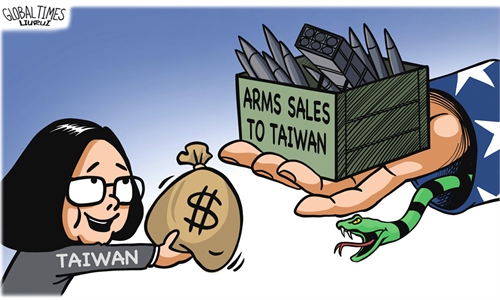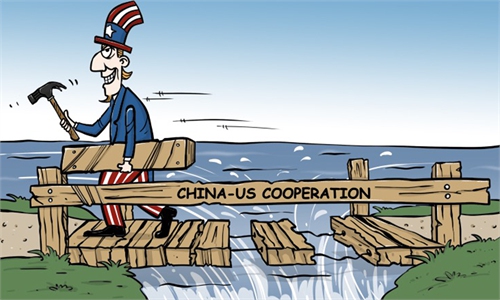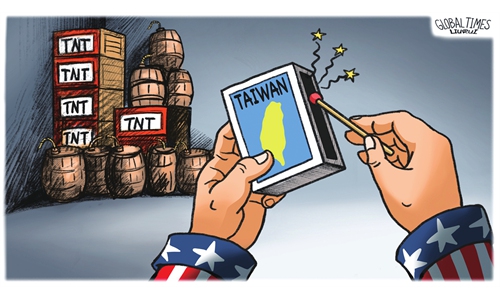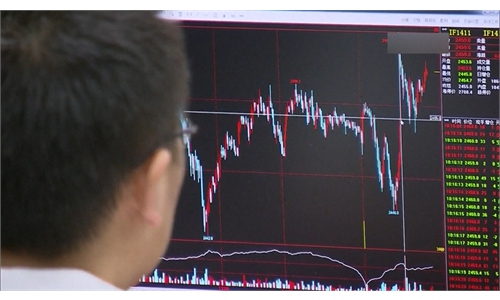US-led G7 repeats playbook of stirring tension, framing China over Straits tension; Pelosi's mess prompts US media to explain why one-China policy matters
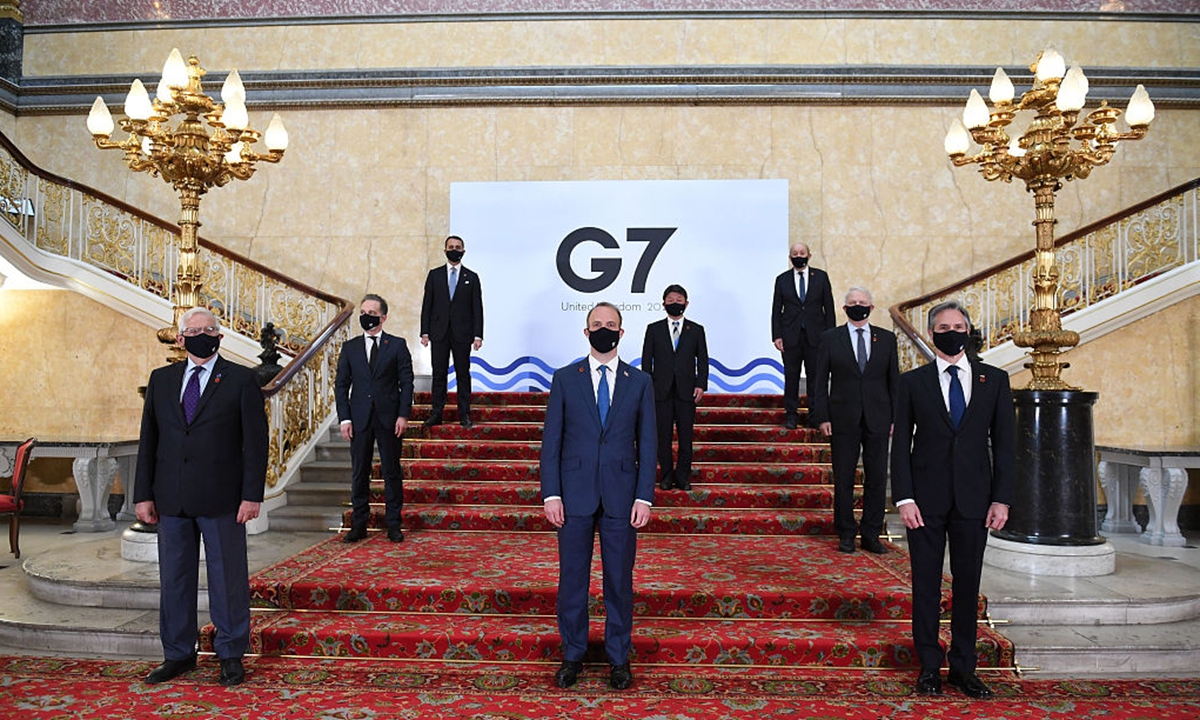
G7 FM meeting. Photo: VCG
With the highly provocative visit of a high-ranking US official to Taiwan being under the spotlight for the past week, the US-led West's wrestling with China has been shifting to pressuring China on the global stage by accusing it of causing the rising cross-Straits tensions, like the US always does in confusing right and wrong. As a puppet of the US, the G7 censured Beijing's legitimate defense and response to Washington's serious provocation, reflecting its hypocrisy, duplicity and ugliness.
As the one-China principle is universally recognized by the international community and the UN resolution affirms the one-China principle, the US-led small clique can't openly challenge this principle otherwise it's challenging the rule-based world order.
But certain countries and politicians, who have been manipulated by Washington to serve the latter's geopolitical goals by playing the Taiwan card, attempted to separate the island from China with the so-called democratic values, intending to follow the suit of the US House Speaker Nancy Pelosi. From how China reacted now and will react to Pelosi's reckless move with comprehensive countermeasures, those countries and politicians should carefully consider the consequences of challenging China's red line, otherwise, they will pay unbearable prices, experts and officials warned.
Both the Chinese Foreign Ministry and the Chinese Mission to the EU slammed the G7 statement on Thursday, calling it evil and shameless, which is reminiscent of the "Eight-Power Allied Forces" that invaded China a hundred years ago. The Chinese State Councilor and Foreign Minister Wang Yi also firmly refuted the statement, saying that it confused the right with the wrong and its wrong deeds aroused the strong indignation from the Chinese people.
"The US instigated the trouble and the crisis, escalating the situation. If we don't react to such malicious and blatant provocation with countermeasures, how can we stick to the principle of non-interference in internal affairs? How can we uphold the international law and safeguard regional peace?" Wang said during the foreign ministers' meetings on East Asia cooperation in Cambodia.
The fundamental reason for the current tension in the Taiwan Straits is that the US ignored China's strong opposition and solemn representation, connived with the US No.3 political figure to visit the island by taking a US military aircraft, which is a major incident of elevating the US-Taiwan relations, seriously damaging one-China principle and China's sovereignty and territorial integrity, Hua Chunying, spokesperson of the Chinese Foreign Ministry, said at a press conference on Thursday.
The US made the malicious provocation first, and China followed with a justifiable defense, Hua said, noting that the G7 nations earlier kept silent and ignored the visit but now have jumped out to accuse China's legitimate reaction, which only exposes their hypocrisy and ugly faces, the spokesperson said.

A naval fleet comprised of the guided-missile destroyers Ningbo (Hull 139) and Taiyuan (Hull 131), as well as the guided-missile frigate Nantong (Hull 601), steams in astern formation in waters of the East China Sea during a maritime training drill .Photo:China Military
'Typical hypocrisy'
After the reckless and dangerous visit of Pelosi prompted a series of countermeasures from China, the G7 foreign ministers along with the High Representative of the EU, issued a joint statement saying that "we are concerned by recent and announced threatening actions" by China, particularly live-fire exercises and "economic coercion," and calling on China not to unilaterally change the status quo by force in the region.
The statement also said, "there is no change in the respective one-China policies," which, in the eyes of Chinese experts, is a typical hypocrisy of the US-led Western bloc in dealing with the Taiwan question.
On the one hand, the G7 members cooperate with the US to create trouble for China on the question but on the other hand, some countries inside the bloc understand their own interests will be affected if they enrage China on the matter, so they are not on the same page with Washington in provoking China and still claim to uphold the one-China policy, a Beijing-based expert on foreign affairs who preferred not to be named told the Global Times on Thursday.
The incident was planned and provoked singlehandedly by the US, and the causes and consequences and the right and wrong are clear. To avoid this crisis imposed on China, China has already made the greatest diplomatic efforts, but at the same time, China will never tolerate any attempt to create tension, instigate confrontation and incite secession in the region, Wang noted.
At 12 pm on Thursday, the People's Liberation Army Eastern Theater Command Army started to conduct major military exercises and training activities including live-fire drills in six large maritime areas and their air space surrounding the island, which will last until Sunday noon. Also, starting Wednesday, Chinese mainland customs authorities suspended imports of citrus fruits and some frozen fish imports from the island. It also suspended exports of natural sand, of which Taiwan reportedly sources over 90 percent from the mainland.
In the meantime, mainland authorities announced Wednesday that a number of diehard "Taiwan secessionist" individuals, two funds, and multiple companies related to secessionist activities will be punished in accordance with the law.
The comprehensive measures taken by China now and in the future are necessary and timely defensive countermeasures, which are made after careful consideration and evaluation, Wang said, noting that the purpose of those measures is to safeguard the national sovereignty and security, which comply with international and domestic law.
They serve as a warning to those who provoke, and help safeguard the regional stability and peace across the Straits, he said.
The way they're accusing China who is a defender of escalating tensions reminded some experts of the playbook how the US-led West provoked Russia and pushed it into a corner and then accused it for launching military operations in Ukraine. Although the Taiwan question is essentially different from the Ukraine crisis, the Western tactics of instigating conflicts are the same, some experts said.
The US, as always, is using G7 as a tool to advance its own interests and agenda. The US is gradually undermining the status quo in the Taiwan Straits by hollowing out its commitment to the one-China policy but then subsequently framing China as the aggressor for responding, Tom Fowdy, a South Korea-based political analyst, told the Global Times on Thursday.
"It is a classic part of the US playbook to do this, and it almost certainly attempts to encourage other countries to also challenge China's red line on Taiwan," he said.
While the Taiwan question is different from the Ukraine crisis, the way that the US seeks to push against other countries' red lines, refuses to compromise and then frames them as aggressors are similar, and also like on the Ukraine issue, the US seeks to build a coalition of countries to oppose China, Fowdy said.
Global consensus
Despite Washington's ill-intentioned attempts to form small cliques to manipulate the understanding of the Taiwan question, the international community clearly shares the consensus on the matter as when it comes to the Taiwan question, there are undeniable historical facts, solid international law and wide international consensus that confirm the basic truth: There is only one China in the world and Taiwan is an inalienable part of China, which is also explicitly stated in the UN resolution.
In responding to Pelosi's visit, UN Secretary-General Antonio Guterres said in the latest press briefing that "our position is very clear, we abide by General Assembly resolutions, by the one-China policy, and that is the orientation that we have in everything we do."
More countries including Cuba, Mexico, Iran, Brazil and South Korea reiterated their adherence to the one-China principle and the UN General Assembly Resolution 2758 on Thursday, condemning Pelosi's provocative visit. Multilateral groups such as ASEAN and Arab League also voiced support for the one-China policy on Thursday.
That the mainland and Taiwan belong to the same country is a fact that hundreds of countries recognized when they established diplomatic relations with China. Only when the international relations are built under historical and legal contexts, will there be a fair world order, Yang Xiyu, a senior research fellow at the China Institute of International Studies, told the Global Times on Thursday.
"If we let the West define this order and the reunification can't be realized, it will serve as a turning point for the global community, which means all the international relations would be defined by geopolitical interests rather than justice," Yang said.
The international community clearly understands why the Taiwan question is sensitive to China and where China's red line is, as some voiced opposition and concerns over Pelosi's visit and the damage it caused.
"We're on a trajectory of escalating conflict and this will certainly make matters worse. It plays well to local politics in the US and in Taiwan, but it does not play well to geostrategic forces that are pushing these two nations apart, Stephen Roach, a Yale University senior fellow and former Federal Reserve economist, was quoted as saying in a report of CNBC on Wednesday.
The leadership in both the US and China to address this conflict is compromised by this basically pouring salt in an open wound for China, he said.
In recent days, a number of US media outlets such as CNBC and the New York Post tried to explain what the "one-China policy" is and why it's important to China. In the eyes of the Chinese public and some experts, Pelosi's visit did only one favorable thing: help more American people understand what China's core interest is.
And when the core interest is threatened, the Chinese government will not hesitate to roll out massive and strong measures and let the provocateurs feel the pain. These countermeasures also serve as a warning to other Western politicians who intend to follow US' path, experts said.
Recently, the German Foreign Minister Annalena Baerbock claimed that German will support the island of Taiwan if the mainland conducts military actions; some UK lawmakers said they're also planning to visit the island later this year. Anti-China politicians in countries like Lithuania also played the Taiwan card but then faced unaffordable fallout for trampling on one-China principle.
Those anti-China politicians should understand that no matter how high they jump on the Taiwan question and how much they advocate, those moves won't affect our strong determination and will in handling the Taiwan question, Wu Xinbo, dean of the Institute of International Studies at Fudan University, told the Global Times.
"When it comes to the Taiwan question, those countries need to be cautious, otherwise, the consequences could be beyond their imagination and become unbearable," he said.

